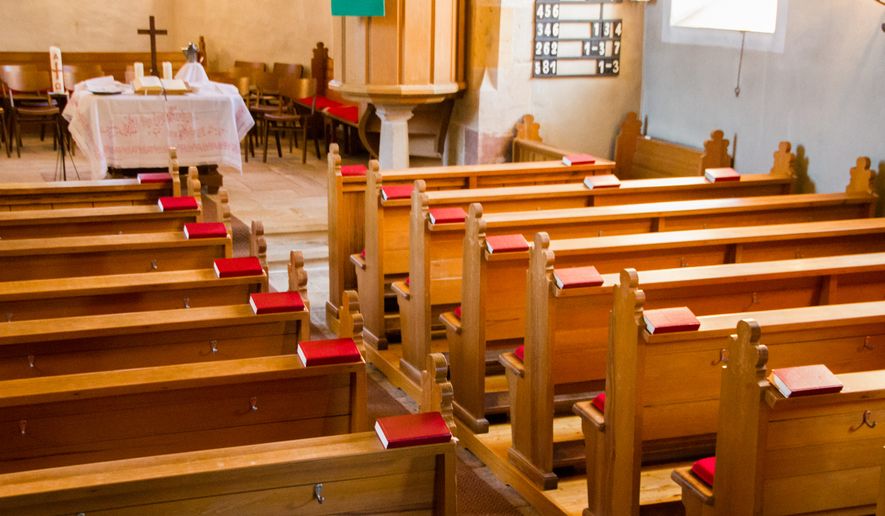An estimated 300 Christian pastors in Canada are planning to deliver Sunday sermons on the Bible’s definition of gender as a reproach to a new ban against the promotion of therapy that aims to change the sexual orientation of gays and lesbians.
Organizers of the preaching protest say about 2,700 U.S. ministers support the effort against the Canadian ban on “conversion therapy,” which labels traditional viewpoints on gender and sexuality as “myths and stereotypes” in its preamble.
Sunday’s sermon campaign seeks to establish “an opportunity each year to remind Canadians how far their liberties have gone from their hands,” said organizer the Rev. Michael Thiessen, president of advocacy group Liberty Coalition Canada. “And to remind the church that God’s good design for men and women and sexuality is something that our country desperately needs,”
Of concern to pastors such as Mr. Thiessen is Bill C-4’s non-specific definition of conversion therapy as well as the bill’s introductory language. He said his group opposes “coercive” therapies and those allegedly involving “torture” of patients, but pastors and counselors should have the right to assist those wanting to deal with unwanted sexual desires.
“The bill’s wording is sufficiently broad to allow for the criminal prosecution of a wide variety of individuals,” said Mr. Thiessen, who is senior pastor at Grace Baptist Church in Alliston, Ontario, about 40 miles north of Toronto.
Bill C-4 defines conversion therapy as any “practice, treatment or service” that seeks to “change” a person’s sexual identity or orientation, including homosexuals, and people who identify as “non-cisgender.” It also criminalizes efforts aimed at changing “a person’s gender expression so that it conforms to the sex assigned to the person at birth.”
Treatment “that relates to a person’s gender transition” or “that is not based on an assumption that a particular sexual orientation, gender identity or gender expression is to be preferred over another” is expressly permitted under the measure.
The ban’s preamble states that conversion therapy “causes harm to the persons who are subjected to it” and is based on “the myth that heterosexuality, cisgender gender identity, and gender expression that conforms to the sex assigned to a person at birth are to be preferred over other sexual orientations, gender identities and gender expressions.”
Mr. Thiessen, who said he faces three years in jail and $300,000 (Canadian) in fines for keeping his church open during COVID-19 restrictions, fears the provisions in Bill C-4 could incite prosecutions for something as simple as an appeal to follow Christian principles expressed in a sermon.
“We will assume that the police who have been consistent to enforce status like and overreaching mandates, we will assume that those same police officers will enforce and respond to complaints about Christians speaking and counseling towards a biblical view of gender and sexuality,” he said.
However, a Canadian evangelical leader — the Rev. Paul Carter, lead pastor of Cornerstone Baptist Church in Orillia, Ontario — says such fears are likely overblown.
Mr. Thiessen’s vision of police writing tickets to preachers is “the worst-case scenario, the most extreme interpretation of the potential application” of Bill C-4’s provisions. Mr. Carter said. “Every legal expert I’ve consulted considers that to be unlikely.”
Mr. Carter says the Canadian Charter of Rights and Freedoms, part of the nation’s constitution, offers protection for pastors and churches, given its guarantees of religious liberty and freedom of expression.
However, those protections — which can be limited by legislation such as Bill C-4 — rely on the Supreme Court of Canada, whose religious liberty outlook has changed markedly over the past 20 years.
In 2001, Canada’s high court sided with evangelical school Trinity Western University when its education graduates were threatened with not becoming licensed teachers. The school had a “community covenant” requiring sexual abstinence by students not in a heterosexual marriage and drew fire from LGBTQ advocates.
In 2018, that same court ruled against Trinity Western’s proposed law school after provincial law societies said they would not admit its graduates to the bar if those law students were required to sign the covenant. The majority of the Supreme Court of Canada sided with the law societies.
• Mark A. Kellner can be reached at mkellner@washingtontimes.com.




Please read our comment policy before commenting.